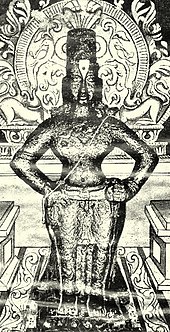sant narhari sonar
Narahari Sonar
Life[edit]
Teachings in abhangas[edit]
Remembrance[edit]
Notes[edit]
- ^ a b c Abbott, Justin Edwards; Godbole, Narhar R. (1933). Stories of Indian Saints: An English Translation of Mahipati's Marathi Bhaktavijaya. 1. Motilal Banarsidass Publ. pp. 326–31. ISBN 978-81-208-0469-2.
- ^ a b c "Glimpses of Holy Lives: Measuring the Immeasurable" (pdf). Prabuddha Bharata. Advaita Ashrama: the Ramakrishna Order started by Swami Vivekananda. 108 (5): 280. May 2003. ISSN 0032-6178.
- ^ Ranade p. 189
- ^ Ranade pp. 204–5
- ^ A. C. Paranjpe (30 September 1998). Self and Identity in Modern Psychology and Indian Thought. Springer Science & Business Media. p. 287. ISBN 978-0-306-45844-6.
- ^ Tom Harrisson (1976). Living Through the Blitz. Cambridge University Press. p. 42. ISBN 978-0-00-216009-4.
- ^ People of India: Maharashtra. Popular Prakashan. 2004. p. 1891. ISBN 978-81-7991-100-6.
 |
| sant narhari sonar |
 |
| sant narhari sonar |
 |
| jai narhari |
 |
| sonarache raje |
 |
| jai narhari caligraphy |





















Comments
Post a Comment